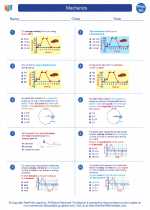Thermodynamics
Thermodynamics is a branch of physics that deals with the study of heat and its relation to energy and work. It provides a framework for understanding how energy is transferred and transformed in physical systems. The study of thermodynamics is crucial in various fields such as engineering, chemistry, and environmental science.
Laws of Thermodynamics
There are four fundamental laws of thermodynamics that form the basis of this branch of physics:
- Zeroth Law of Thermodynamics: If two systems are in thermal equilibrium with a third system, then they are in thermal equilibrium with each other. This law establishes the concept of temperature and the basis for temperature measurement.
- First Law of Thermodynamics (Law of Energy Conservation): The total energy of an isolated system is constant. It states that energy can neither be created nor destroyed, but can only change forms.
- Second Law of Thermodynamics: The total entropy of an isolated system can never decrease over time. This law introduces the concept of entropy and the direction of natural processes.
- Third Law of Thermodynamics: As the temperature of a system approaches absolute zero, the entropy of the system approaches a minimum value. This law provides a fundamental reference point for the determination of entropy at absolute zero temperature.
Basic Concepts in Thermodynamics
Understanding thermodynamics involves familiarizing oneself with several key concepts:
- Temperature: A measure of the average kinetic energy of the particles in a system. It is commonly measured in degrees Celsius (°C) or Kelvin (K).
- Heat: The transfer of thermal energy between two bodies at different temperatures. It is quantified in units of joules (J) or calories (cal).
- Work: In the context of thermodynamics, work is done when a force acts on a body and causes it to move a distance. It is measured in joules (J).
- Internal Energy: The total energy contained within a system, including the kinetic and potential energies of its particles.
- Entropy: A measure of the disorder or randomness of a system. It tends to increase in natural processes.
Applications of Thermodynamics
Thermodynamics has numerous practical applications, including:
- Heat Engines: Understanding thermodynamics is crucial for the design and operation of heat engines, such as steam engines and internal combustion engines.
- Refrigeration and Air Conditioning: The principles of thermodynamics are essential in the development of refrigeration and air conditioning systems.
- Chemical Reactions: Thermodynamics plays a vital role in determining the feasibility and direction of chemical reactions.
- Renewable Energy: The study of thermodynamics is integral to the advancement of renewable energy technologies, such as solar panels and wind turbines.
Study Guide
When studying thermodynamics, it's important to focus on the following key areas:
- Understanding the laws of thermodynamics and their applications.
- Mastering the concepts of temperature, heat, work, internal energy, and entropy.
- Practicing problem-solving involving heat transfer, work done, and changes in internal energy.
- Exploring real-world applications of thermodynamics in various fields.
- Strengthening your understanding of heat engines and refrigeration systems.
By grasping these fundamental principles and concepts, you'll be well-equipped to navigate the fascinating and diverse world of thermodynamics.
.


